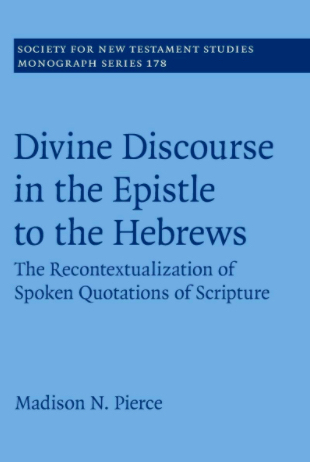2022.02.01 | Madison N. Pierce. Divine Discourse in the Epistle to the Hebrews: The Recontextualization of Spoken Quotations of Scripture. Society of New Testament Studies Monograph Series 178; Cambridge: Cambridge University Press, 2020. ISBN: 9781108495417.
Review by Jonathan Rowlands, St. Mellitus College.
In this monograph, Pierce argues that “the author of Hebrews uses divine discourse—the speech of God—in Hebrews to develop his characterization of God and by extension his broader argument … [such that] these speeches are crucial to his argumentation.” (2). This argument is made primarily with reference to the author’s use of ‘prosopological exegesis’ of Jewish Scriptures. This technique “interprets texts by assigning ‘faces’ (πρόσωπα), or characters, to ambiguous or unspecified personal (or personified) entities represented in the text in question … for clarity of understanding” (4). Following a discussion about prosopological exegesis in antiquity (6-20) and techniques for identifying its use (20-22), Pierce introduces the particular use of this technique in Hebrews, culminating in an overview of previous treatments of divine speech in Hebrews (28-33).
Read the rest of this entry »


